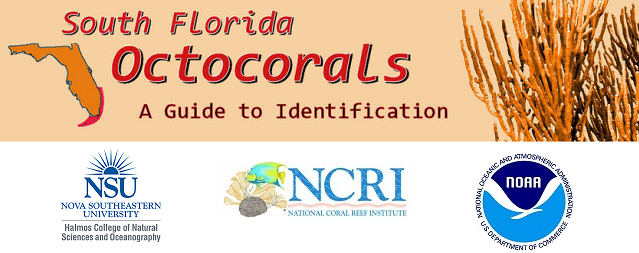Preview

Family
Plexauridae
Common Name(s)
False whip plexaura
Colony Form
Large, dichotomously branched, bushy or in one plane; to 1 m tall.
Axis
Cylindrical
Branches
Long, thin, tapering, ~ 2-3 mm diameter.
Apertures
Small, smooth, round to slightly oval, ~ 1mm across, in irregularly scattered vertical rows; distance between apertures equal to or greater than aperture diameter; no projecting calices.
Mucus
Slimy
Color
Living specimens beige to purple. Dries purplish brown or light yellowish-brown. In alcohol pale gray or white.
Sclerites
Polyp armature: few flat little rods. Axial layer: small multi-radiate dark purple capstans (chiefly <0.15 mm in terminal branches). Outer layers: small leaf-clubs (0.1-0.15 mm), slender, both purple and white, often bent spindles with prominent but not crowded tubercles, to 0.5 mm long, but usually smaller.
Habitat
Most reefs in 2.5-50 m; most common in 15-20 m.
Distribution
Bermuda, South Florida, Caribbean Sea.
Similar Species
Pseudoplexaura porosa; Pseudoplexaura wagenaari; Plexaurella grisea; Eunicea knighti
Date Taken
4-11-2016



Notes
Distinguished by short, narrow spindles, leaf-clubs and capstans on outer cortex (Bayer, 1961). Wide spacing of apertures distinguishes this species from P. porosa (Bayer, 1961). Flamingo tongue gastropods, Cyphoma spp., are common predators of P. flagellosa (Harvell and Suchanek, 1987).